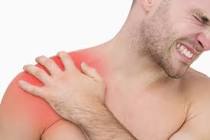Shoulder joint pain and trigger point areas in shoulder region

What is True core stability ?
September 18, 2016
What is Kinesiology?
December 5, 2016 Shoulder pain and trigger point areas in the shoulder region are very common amongst athletes and recreational athletes. Pain in this area can be more annoying and become chronic over short term period. Shoulder pain is a common problem with an estimated prevalence of 4% to 26%.The most common source of shoulder pain is the rotator cuff, accounting for over two-thirds of cases.
Shoulder pain and trigger point areas in the shoulder region are very common amongst athletes and recreational athletes. Pain in this area can be more annoying and become chronic over short term period. Shoulder pain is a common problem with an estimated prevalence of 4% to 26%.The most common source of shoulder pain is the rotator cuff, accounting for over two-thirds of cases.
https://www.ncbi.nlm.nih.gov/pmc/articles/PMC3217726/
Common causes of shoulder pain include:
- Bursitis ( local pain with movements)
- Cervical radiculopathy ( referred pain from neck)
- Frozen shoulder ( painful stiff shoulder)
- Impingement ( catching pain when in certain angles)
- Acute or Chronic Osteoarthritis ( long standing “wear-and-tear”)
- Polymyalgia rheumatica ( chronic and multiple joints involve)
- Rotator cuff injury ( painful especially during overhead activities)
- Sprains and strains ( overuse or sudden pain)
- Tendinitis ( overuse : acute or chronic)
- Tendon rupture ( sudden onset of pain and weakness)
- Torn cartilage or labral tear ( chronic shoulder pain)
- “Rugby” shoulder (multiple wear and tear of shoulder structures)
- Trigger points ( Myofascial pain syndrome)
At our clinic we focus on the integrated care between sports medicine doctor, physiotherapy, chiropractor and kinesiologist. After a thorough clinical assessment, we have the option to do a diagnostic ultrasound to specify the cause of your shoulder pain and to exclude trigger point areas.
The last few months we treated many patients with the following protocol:
- Assessment by doctor or physiotherapist.
- Diagnostic ultrasound to confirm pathology
- Modification of training or activity
- Platelet rich plasma infiltration (PRP) or anti-inflammatory procedures to relief the pain and discomfort
- Other treatments we include in your plan: dry needling, physiotherapy, deep tissue massage, taping and other individualized modalities specific to patient pathology.
- Successful pain free return to your activity or sport.
Plasma infiltration for trigger point areas or shoulder pain is performed under ultrasound guidance. This insures that we reach the specific area of injury and at the right dosage. Follow up ultrasounds allow us to monitor the response on treatment and determine the correct rehabilitation.
Trigger point areas in the shoulder and scapula region are also very common. We treated now many patients with persistent trigger point pain.
Case studies
- 27 year old female athlete that struggled with persistent trigger point bands and referred pain in her shoulder region. She responded well with sports massage but relief was only short term. After assessment we did trigger point injections under ultrasound guidance and integrate this with physio and chiropractic sessions. 2 weeks later the patient regain her pain free motion and has a palpable difference in the tenderness of her trigger points
- 36 year old patient with shoulder pain now for more than 1 year. He had pervious surgery on his shoulder. He was unable to do his normal exercise in gymnasium and seek for help. After assessment, we proceed with 2x Plasma injection in his shoulder under ultrasound guidance. After 4 weeks of initial treatment patient has 80% improvement and his shoulder function and he is now able to exercise withy more efficiency.
- 22 year old cricket player with a tear of one of his shoulder muscles. He suffered from severe weakness in his bowling arm and was unable to lift up his shoulder. We complement his physio rehab with PRP infiltration in his injured muscle under ultrasound guidance. His improvement was visible within 7 days and he is now almost 70% back to normal after 3 weeks of initial treatment
- 56 year lady with frozen shoulder. She had 8/10 pain and was unable to do her daily task. Pain has been persistent for 8 months. We relief her pain with an intra-articular injection of cortisone under ultrasound guidance. She had very good pain relief and was able to complete active physio sessions and regain 70% of her motion and was able to do her daily tasks.
- 33 year female weight trainer that suffered from long standing shoulder pain due to previous surgery and dislocation of shoulder. Weakness and limited range of motion was her prominent symptoms. We started her on a 2 weekly infiltration of PRP in her shoulder joint under ultrasound guidance and physiotherapy. Her range of motion improved by 70% and her movement now is pain free. She still have to follow a strict rehab program with her physio to ensure long term improvement
Dr. Arthur




